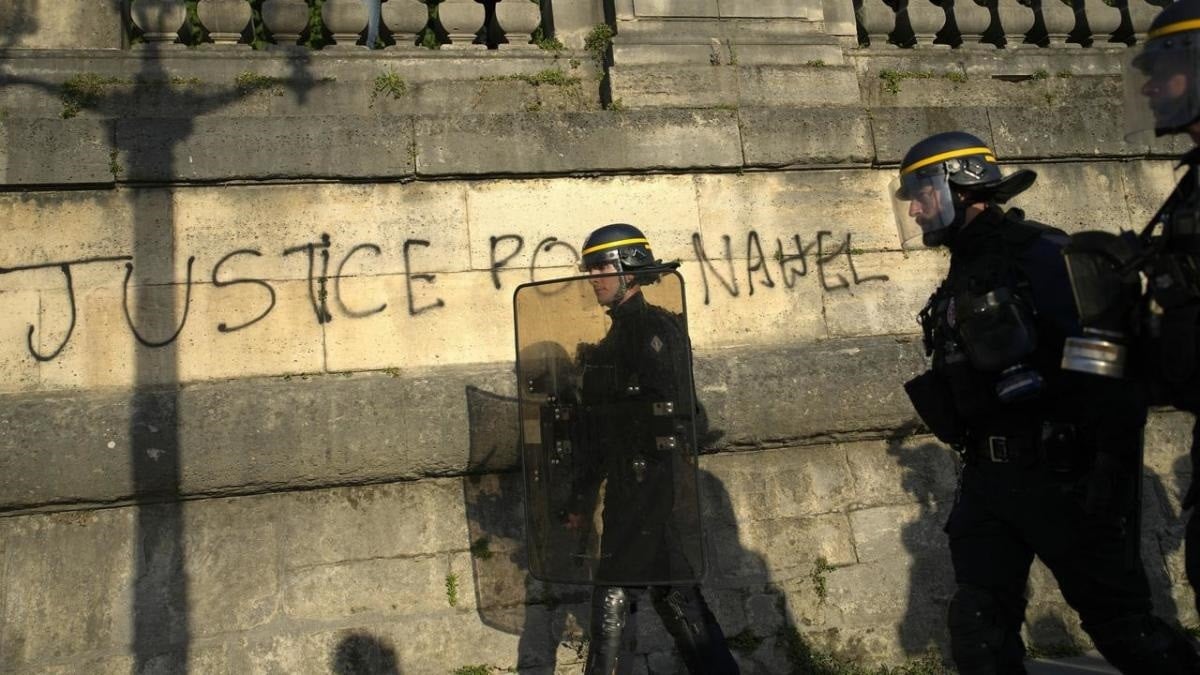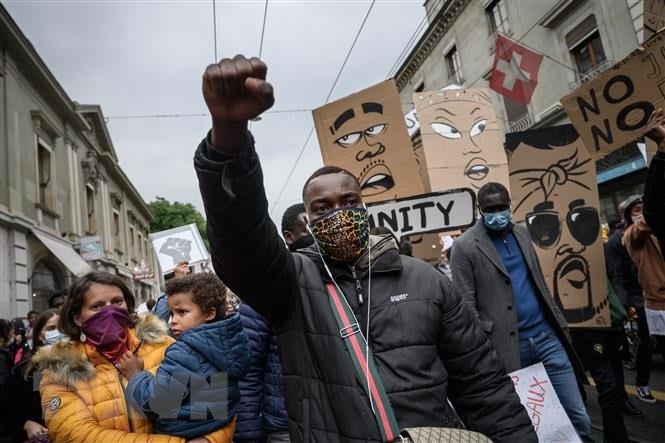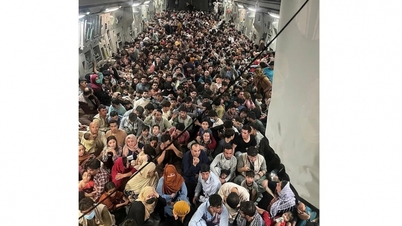 |
| French police patrol Paris on July 5th. (Source: AP) |
The wave of protests that swept across France following the police shooting of a black teenager rocked the country during the first week of July. But police violence wasn't the primary cause of the protests quickly escalating into riots. The root cause of this loss of security control was a painful truth: racism.
Worse still, this is not just a problem for France or Europe, but a major challenge to human rights worldwide , requiring governments to adopt the right approach, make strong commitments, and take decisive action.
The pain of France
On June 29, Nahel Merzouk, a 17-year-old Algerian boy, was shot dead by French police for failing to comply with a traffic stop order. This is not the first time someone has died as a result of police violence, nor is it the first time the French have taken to the streets to express their outrage and demand justice for victims.
But this was the first time protests had rapidly escalated into riots, arson, and looting in a short period, occurring on a wider scale and with greater danger. Nothing seemed safe from the fury of the agitated crowds, from supermarkets, shops, and post offices to libraries, schools, police stations, and even town halls. The French Mayors' Association stated that the violence targeted “symbols of the republic,” causing unprecedented damage.
Some argue that this is a continuation of the shocking events of 2005 in France, stemming from similar causes. Two Black teenagers, Zyed Benna and Bouna Traore, were electrocuted to death while fleeing a police chase. The incident plunged the "suburbs"—areas inhabited by immigrants in France—into riots that lasted for three weeks. This event is considered a landmark moment, marking the beginning of more forceful voices from marginalized and discriminated Black communities in France demanding equal treatment.
Seventeen years have passed, but the Nahel incident has brought back the "ghost" of the 2005 riots to haunt France even more intensely. This shows that racial divides have hardly improved and the pain of racial discrimination continues to smolder within France for decades.
France has always declared itself a "color-blind" republic, meaning that the government does not conduct censuses or collect any other data related to the race of its citizens. Accordingly, no French person is judged on their religion or skin color. France asserts that all citizens are French and that the government must resolutely avoid all forms of discrimination.
That's the "philosophy" that France pursues, but the reality is quite different. According to Le Monde , young people from the "suburbs" struggle more than their white peers to find suitable jobs. The French National Urban Policy Research Agency published a report showing that the chances of a suburban resident successfully securing employment are 22% lower than those living in major cities.
Candidates with Arabic names receive 25% less positive feedback than those with French names. Even after being hired, they are rarely treated fairly compared to their white colleagues in terms of salary, benefits, and opportunities for advancement. Research by the French Human Rights Agency indicates that young men of color or Arab men are 20 times more likely to be pulled over by the police than other groups.
According to a February 2023 report by the French Black Association, 91% of Black people in the country said they were victims of racism. Racist behavior occurred most frequently in public places (41%) and workplaces (31%). Reasons for the exclusion of Black people included religious differences, wealth inequality, high unemployment rates, and high crime rates.
Because they are not given the opportunity to integrate, they constantly feel inferior and alienated even within their own country. Because they are not given opportunities, they are almost unable to escape poverty. This is also why they are easily drawn into illegal activities. Committing crimes leads to discrimination, and the more they are discriminated against and isolated, the more likely they are to commit crimes. This vicious cycle causes racial discrimination to deepen and become inescapable.
The recent insecurity is a consequence of the long-standing divisions and rifts within French society. Compared to previous decades, the nature of the protests has changed. Today, it's not just people of color, immigrants, and low-income earners who are speaking out for equality for their communities; there is also participation from many people of French descent, white people, and the intellectual class.
According to reports, the majority of the riots were perpetrated by teenagers aged 14-18. Certainly, the authorities in Paris do not want future generations of France to grow up with the anger and hatred stemming from racism.
France is not the only place experiencing the pain of racial discrimination, and the case of teenager Nahel is merely the straw that broke the camel's back, fueling the resentment of the marginalized working class.
Demanding justice for Nahel, or any other victim of police violence, means demanding justice for the marginalized and marginalized. Demanding justice for the people of the "suburbs" is also demanding justice for other vulnerable groups in France, in Europe, and around the world.
| France is not the only place experiencing the pain of racial discrimination, and the case of teenager Nahel is merely the straw that broke the camel's back, fueling the resentment of the marginalized working class. Demanding justice for Nahel, or any other victim of police brutality, means demanding justice for the vulnerable and marginalized. Demanding justice for the people of the "suburbs" is also demanding justice for other vulnerable groups in France, in Europe, and around the world. |
 |
| Protests against racial discrimination in Geneva, Switzerland. (Source: AFP) |
Seeking a comprehensive solution.
The French government was quick to comment following the police shooting death of the young black man Nahel, but no statement acknowledged a racially motivated connection to the incident. President Emmanuel Macron called the officer's actions "inexplicable and inexcusable."
The Elysee Palace stressed that this was an "individual act," not representative of the spirit of the French police. Meanwhile, the French Foreign Ministry asserted that "any allegations of racism or systemic discrimination by the police in France are completely unfounded."
However, sociologists do not consider Nahel's case to be "inexplicable," as the French President suggested; rather, the explanation lies in racism. Prejudices against people from "the suburbs" are an undeniable reality in France.
The Office of the UN High Commissioner for Human Rights also issued a statement saying that “now is the time for France to seriously address the deep-seated issues of racism and discrimination in law enforcement.”
The police officer who shot and killed Nahel has been charged with premeditated murder, although French police officials have defended him, saying he was only doing his job. But no matter how harsh the sentence, this will not be a solution to the thorny and persistent problems dividing French society.
According to researcher Pavel Timofeyev, Director of the Department of European Political Studies at the Institute of World Economy and International Relations of the Russian Academy of Sciences, the problem lies not in the law enforcement mechanisms of the French police, but in their relationship with minority communities such as immigrants, people of color, and Muslims.
Of course, differences in origin, culture, ethnicity, and religion are barriers. But the reality is that the French government has not truly created conditions to help the "suburban" community integrate into society. Paris also appears indifferent, lacking decisive policies to break down prejudices against people of immigrant origin.
First and foremost, France needs to frankly acknowledge the existence of racism in the country. Only when the French government clearly recognizes the security and social risks that racism can pose can it act appropriately to bridge the gap between communities. For people in the "suburbs," recognition is extremely important and is the first step towards becoming part of French society.
Racism is not only a pressing issue in France but also throughout Europe. The recent massive protests and riots in France have quickly spread to several countries in the region, such as Belgium and Switzerland.
In Belgium, police arrested more than 60 people in protests that followed calls on social media to "act as in France."
Meanwhile, the situation in Lausanne, Switzerland, tended to be more violent as protesters attacked shops and police. This shows that resentment over racism exists not only in France but across Europe – where immigration remains a contentious issue.
Of particular concern is that some European governments have used the riots as a pretext to tighten immigration policies, at a time when the European Union (EU) is hoping for an agreement on the distribution of asylum seekers among its 27 member states.
Far-right groups across Europe argue that immigrants are the root cause of insecurity and that they do not want to see what just happened on the streets of France repeated in their own countries. This could lead to negative developments in efforts to address the migration issue and further widen the divide between immigrants and native societies.
There is no one-size-fits-all formula for addressing racial discrimination, but it is certainly not something governments can ignore. Deliberately ignoring the problem will only make it worse and more difficult to resolve.
Changing deeply ingrained societal views is difficult, but not impossible. Only when governments recognize that skin color or religion are not the defining characteristics of a person can they implement appropriate policies to ensure that all citizens enjoy equal rights.
Source







![[Photo] Prime Minister Pham Minh Chinh presides over a meeting on private sector economic development.](/_next/image?url=https%3A%2F%2Fvphoto.vietnam.vn%2Fthumb%2F1200x675%2Fvietnam%2Fresource%2FIMAGE%2F2025%2F12%2F20%2F1766237501876_thiet-ke-chua-co-ten-40-png.webp&w=3840&q=75)





































































































Comment (0)